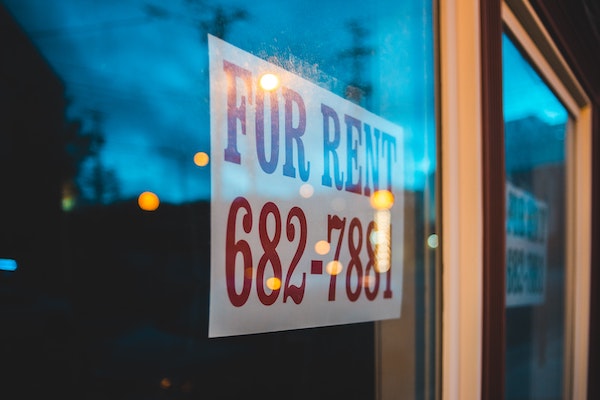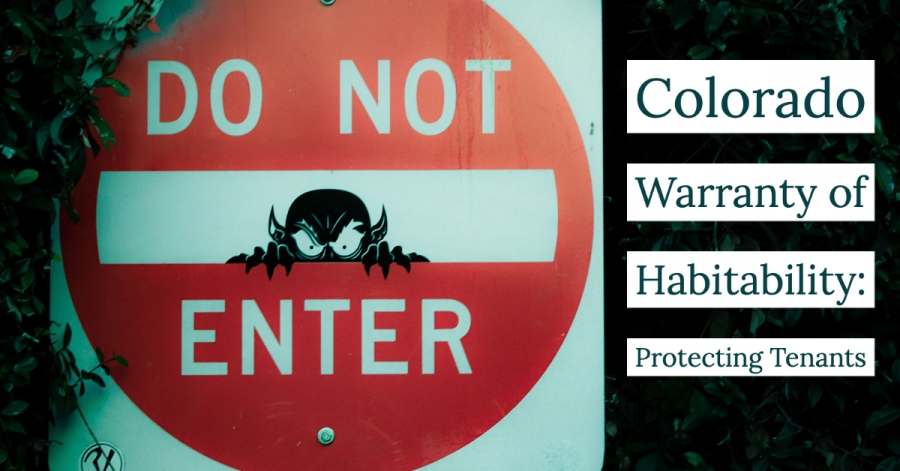The Colorado Warranty of Habitability is a statute that outlines conditions that a property must meet in order for it to be considered fit for human habitation.
This statute was established in 2008 to protect tenants from unscrupulous landlords. Since then, there have been a few updates and changes made to the document, with the latest changes taking place in 2018.

This statute addresses issues that wouldn’t normally arise in rentals that have attentive and fair landlords, however, some of these problems are things that are found in low-income rentals and student housing, which makes this warranty an important tool in helping to prevent dangerous and uninhabitable living conditions.
This warranty states that each rental lease in Colorado carries what is known as an implied warranty of habitability, which stipulates that a landlord is bound by law to keep the property in a habitable state, regardless of whether this is written in the rental agreement or not.
But what does this mean for landlords? What are the requirements outlined in the law? How can you ensure that you’re maintaining your property in a way that’s in compliance with this statute?
Let’s take a look now:
Colorado Warranty of Habitability: What Does It Mean?
First of all, let’s see what the Warranty of Habitability states about the condition of a property.
According to the warranty, residential property is considered uninhabitable if it substantially lacks any of the following:
- Waterproofing - Waterproofing and weather protection of roof and exterior walls must be kept in good working order. This includes intact, unbroken windows and doors.
- Plumbing - Plumbing or gas facilities must conform to applicable law in effect at the time of installation and be maintained in good working order.
- Running Water - Running water and reasonable amounts of hot water at all times must be furnished to appropriate fixtures and connected to a proper sewage disposal system
- Heat – There must be functioning heating facilities that conformed to applicable law at the time of installation and that are maintained in good working order.
- Lighting - Electrical lighting, with wiring and electrical equipment that conformed to applicable law at the time of installation, must be maintained in good working order.
- Clean Common Areas - Common areas and areas under the control of the landlord must be kept reasonably clean, sanitary, and free from all accumulations of debris, filth, rubbish, and garbage and have appropriate extermination in response to the infestation of rodents or vermin.
- Pest Control Measures – There must be appropriate extermination measures taken in response to the infestation of rodents or vermin.
- Sanitation – There must be an adequate number of appropriate exterior receptacles for garbage and rubbish, in good repair.
- Floors, Stairs, Railings - Floors, stairways, carpets, and railings must be maintained and kept in good repair.
- Locks - There must be locks on all exterior doors and locks or security devices on windows designed to be opened that are maintained in good working order.
- Compliance With Codes - The premise must comply with all applicable building, housing, and health codes, which, if violated, would constitute a condition that materially affects or is dangerous or hazardous to a tenant’s health or safety.
- Absence of Mold - Recent amendments to this bill state that the absence of mold is another requirement of a habitable residence.
- Appliances – Recent amendments to this bill also state that functioning appliances that conformed to applicable law at the time of installation, and that are maintained and in good working order are another requirement.
Unless otherwise stated in section 38-12-506 of the bill, a residence must comply with these regulations –prior to being rented out. So, landlords should make sure their properties are compliant before running rental ads!

It’s important to note that the warranty states that no deficiency shall render a premise uninhabitable unless it substantially limits the tenant’s use of the dwelling. So if something breaks down, or requires repairs, this doesn’t automatically mean that you’re in breach of the warranty. Things will go wrong and break down –and you have a reasonable amount of time to complete the repairs.
What this statute aims to do, is to prevent landlords from allowing their properties to become uninhabitable, and to give tenants recourse should landlords be slow to remedy problems that do arise.
So a landlord is in breach of the warranty if:
- A residential premise is uninhabitable or otherwise unfit for human habitation; and
- The residential premise is in a condition that materially interferes with a tenant’s life, health, or safety; and
- The landlord has received written notice of the condition and failed to resolve the problem within a reasonable time.
Now, if the condition of the property is an issue that was caused by the misconduct of the tenant, a member of the tenant’s household, or a guest or invitee of the tenant –then this condition does not constitute a breach of the warranty of habitability.
Exceptions to Warranty of Habitability:
- If the uninhabitable condition is the result of stalking, or domestic violence, domestic abuse, unlawful sexual behavior upon the tenant, and the landlord has been given written notice and evidence of the domestic violence, abuse, or stalking.
- If the uninhabitable condition is the result of a casualty or catastrophe to the dwelling unit, the landlord may terminate the rental agreement without further liability
Tenant Recourse: Remedies and Requirements
Tenants have recourse, should the property they’re renting becomes uninhabitable.
However, it’s important to note that this must be a genuine case of a breach, not simply an excuse to break the lease or stop paying rent. This would put the tenant's security deposit at risk as well as leave the tenant responsible for any remaining rents.
Here’s a look at what the Colorado Warranty of Habitability, as well as the steps the tenant needs to take to remain in compliance with the law.
If the premises become legally uninhabitable based on the above criteria, the tenant should first notify the landlord.
The landlord must have been given notice of the problem by the tenant. They then have a reasonable timeframe during which they can remedy the problem. A landlord has 24 hours to respond after receiving the notice, and their response must indicate their intentions for remedying the condition, along with an estimate of when they expect that the remediation will commence and be completed.
Obtaining an Injunctive Relief:
A tenant may obtain injunctive relief for breach of the warranty of habitability in any county or district court. The court will determine actual damages for a breach of the warranty at the time the court orders the injunctive relief.
However, the landlord will not be subject to any court order for injunctive relief if they tender the actual damages to the court within two business days after the order. Upon application by the tenant, the court will release to the tenant the damages paid by the landlord. If the tenant vacates the rental, the landlord shall not be permitted to rent the premises again until it complies with the warranty of habitability.
Additionally, amendments to this bill also state that a tenant may deduct the cost to repair or remedy the condition themselves; however, the tenant must obtain an estimate for the costs first. If the amount is greater than one month’s rent, then the tenant may deduct over subsequent months until the amount of the estimate is deducted.
The tenant must provide the landlord with at least ten but no more than thirty days’ notice prior to deducting rent.
If a court finds that a tenant has wrongfully deducted rent, the court will award the landlord either possession of the premises or an amount of money equal to the amount wrongfully withheld, or –if the tenant is found to have acted in bad faith, an amount of money equal to double the amount wrongfully withheld.
Terminating the Lease
If the same condition that caused a breach of the warranty recurs within six months after the condition had been repaired, then the tenant may terminate the rental agreement. They must provide fourteen days’ notice to the landlord. If, however, the landlord remedies the condition within fourteen days of receiving the notice, then the tenant may not terminate the agreement.
In the case that a rental agreement contains a provision related to obtaining attorney fees and costs, then the prevailing party shall be entitled to recover reasonable attorney fees and costs.
Prohibition on Retaliation
The Colorado Warranty of Habitability also prohibits retaliation. If a landlord retaliates against a tenant alleging a breach, then the tenant may terminate the rental agreement and recover an amount not more than three months’ rent or three times the tenant’s damages, whichever is greater –along with reasonable attorney costs.
As a landlord, your best option is to keep your property in good, habitable condition, and to respond to any issues that arise –especially those that would render it uninhabitable, in a timely manner.
It’s also important to protect yourself with an airtight lease agreement, one that outlines the condition that you and the tenant are required to keep the property in, and specifies which party is responsible for what tasks. Also vital, is maintaining good documentation of repairs as well as any agreements, or communication with your tenants. Finally, it’s important to have a working knowledge of landlord-tenant law so that you have a good understanding of your requirements and responsibilities, as well as the rights of your tenants.








